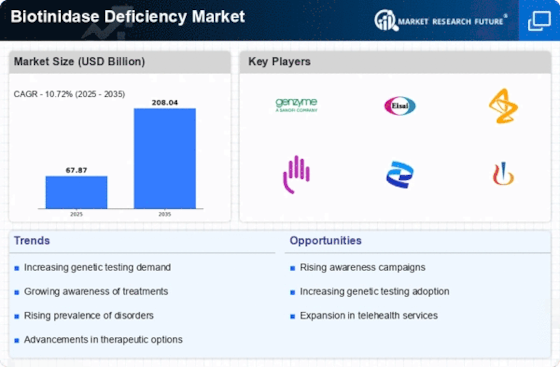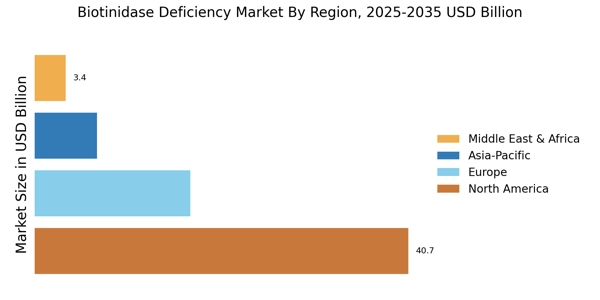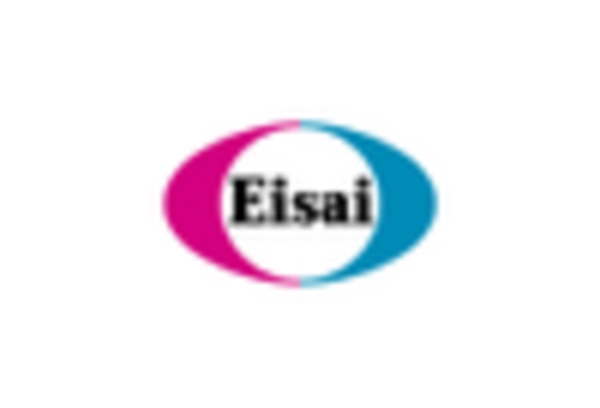Rising Demand for Nutritional Supplements
The rising demand for nutritional supplements is emerging as a significant driver in the Biotinidase Deficiency Market. Individuals diagnosed with biotinidase deficiency often require biotin supplementation to manage their condition effectively. As awareness of the disorder grows, so does the need for high-quality biotin supplements tailored to meet the specific needs of patients. Market data indicates a steady increase in the consumption of dietary supplements, particularly those aimed at addressing metabolic disorders. This trend is further supported by the growing health and wellness movement, which emphasizes preventive care and nutritional support. Consequently, the Biotinidase Deficiency Market is likely to benefit from this rising demand, as more patients seek reliable and effective supplementation options to manage their condition.
Growing Investment in Research and Development
Investment in research and development is a pivotal factor propelling the Biotinidase Deficiency Market forward. Pharmaceutical companies and research institutions are increasingly focusing on developing novel therapies and treatment protocols for biotinidase deficiency. This surge in R&D efforts is driven by the need for more effective and targeted treatments, as well as the potential for new drug approvals. Recent data indicates that the global market for rare disease therapies is projected to reach substantial figures, reflecting the lucrative opportunities within this niche. As more resources are allocated to understanding the underlying mechanisms of biotinidase deficiency, the market is likely to witness the introduction of innovative therapeutic options. This trend not only enhances treatment efficacy but also fosters collaboration between academia and industry, further stimulating growth in the Biotinidase Deficiency Market.
Technological Advancements in Diagnostic Tools
Technological innovations in diagnostic tools are transforming the landscape of the Biotinidase Deficiency Market. The development of advanced genetic testing methods, such as next-generation sequencing, has enhanced the accuracy and speed of diagnosing biotinidase deficiency. These advancements allow for earlier detection, which is critical for effective management of the condition. Moreover, the integration of telemedicine and digital health solutions is facilitating access to diagnostic services, particularly in underserved regions. As these technologies become more widely adopted, the market is expected to expand, driven by the increasing demand for precise and timely diagnostic options. The ability to identify biotinidase deficiency at an early stage can significantly improve patient outcomes, thereby reinforcing the importance of continued investment in diagnostic innovations within the Biotinidase Deficiency Market.
Increasing Prevalence of Biotinidase Deficiency
The rising incidence of biotinidase deficiency is a crucial driver for the Biotinidase Deficiency Market. Recent estimates suggest that the condition affects approximately 1 in 60,000 births, leading to a growing need for early diagnosis and treatment options. As awareness of metabolic disorders increases, more cases are being identified, which in turn drives demand for diagnostic tests and therapeutic interventions. This trend indicates a potential expansion in the market, as healthcare providers and families seek effective solutions to manage this genetic disorder. The increasing prevalence not only highlights the necessity for innovative treatments but also emphasizes the importance of educational initiatives aimed at healthcare professionals and the public. Consequently, the Biotinidase Deficiency Market is likely to experience significant growth as more individuals are diagnosed and treated.
Increased Awareness Among Healthcare Professionals
The heightened awareness of biotinidase deficiency among healthcare professionals is significantly influencing the Biotinidase Deficiency Market. As medical education programs increasingly incorporate information about rare genetic disorders, healthcare providers are better equipped to recognize symptoms and recommend appropriate testing. This growing knowledge base is crucial for early diagnosis and intervention, which can lead to improved patient outcomes. Furthermore, professional organizations are actively promoting guidelines and best practices for managing biotinidase deficiency, thereby enhancing the overall standard of care. The increased focus on training and education is likely to result in a higher rate of diagnosis, subsequently driving demand for treatment options. As healthcare professionals become more informed, the Biotinidase Deficiency Market is expected to expand, reflecting the positive impact of education on patient care.


















